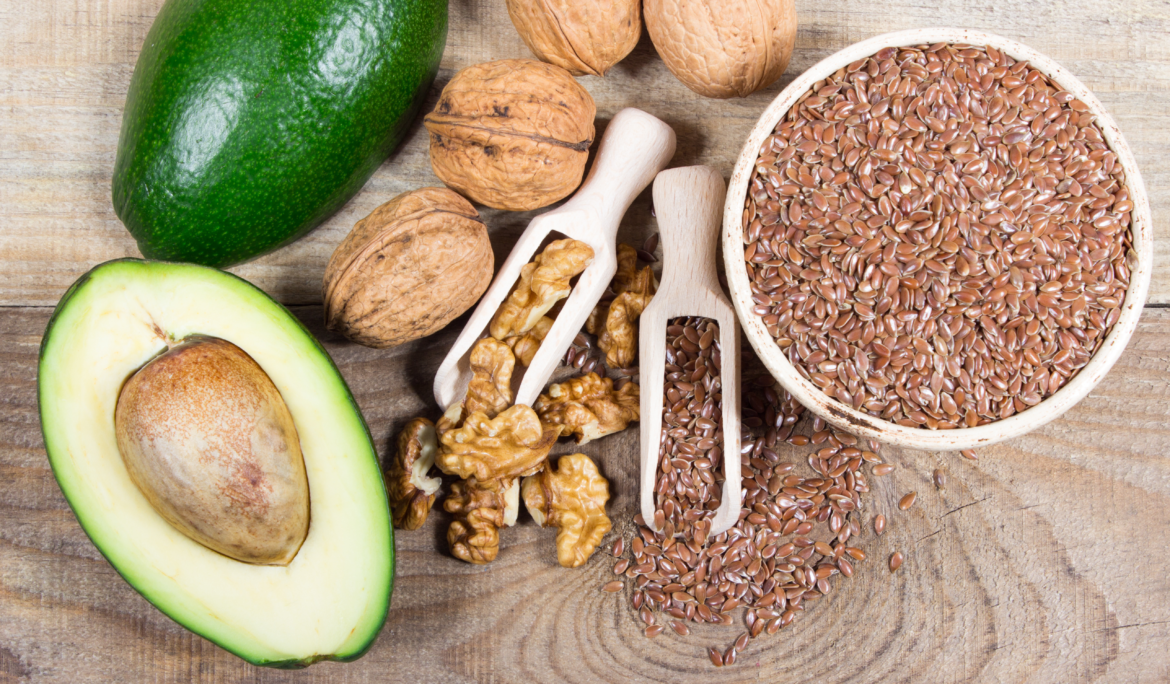In the expansive realm of nutrition, certain nutrients emerge as pivotal players, weaving intricate tapestries of well-being within our bodies. Among these, Omega-3 fatty acids stand as pillars of health, revered for their multifaceted benefits. For vegans, who tread the path of ethical dietary choices, understanding and obtaining the various forms of Omega-3s—ALA, EPA, and DHA—become essential. In this comprehensive exploration, we delve deep into the intricate world of Omega-3 fatty acids, demystify their roles, sources, and significance, and unveil effective strategies for vegans to ensure their daily intake.
Understanding Omega-3 Fatty Acids: Nurturing Wellness Through Healthy Fats
Omega-3 fatty acids, a cornerstone of nutritional science, are a class of polyunsaturated fats renowned for their pivotal roles in promoting health and well-being. These essential fats are named for their chemical structure, featuring a double bond three carbon atoms away from the omega (end) of the fatty acid chain. While the intricacies of their chemical composition might sound complex, the essence of Omega-3s is elegantly simple: they are a group of healthy fats that play diverse roles in supporting our body’s vital functions.
Omega-3s are celebrated for their remarkable influence on heart health, cognitive function, and inflammation management. While they are not produced by the body in sufficient quantities, they are deemed “essential” due to their fundamental importance to our health. These fats act as building blocks for cell membranes, influencing cell structure and function throughout the body.
ALA, EPA, and DHA are the three primary types of Omega-3 fatty acids, each with distinct roles and sources. ALA is typically derived from plant-based sources like flaxseeds, chia seeds, and walnuts. EPA and DHA, on the other hand, are predominantly found in marine sources such as fatty fish and algae.
In summary, Omega-3 fatty acids are a class of healthy fats that our bodies cannot produce on their own, making their inclusion in our diets vital. Their far-reaching effects on heart health, brain function, inflammation modulation, and more make them a cornerstone of optimal nutrition and well-being.
Deciphering Fatty Acids: Building Blocks of Nutrition and Health
Fatty acids, the fundamental building blocks of fats, are essential components that contribute to the intricate dance of nutrition within our bodies. These organic molecules consist of chains of carbon atoms adorned with hydrogen atoms, and they serve as the bedrock of energy storage, cellular structure, and the synthesis of vital compounds.
Fatty acids are categorized based on their structure, with two primary groups: saturated and unsaturated. Saturated fatty acids boast single carbon-carbon bonds, resulting in a straight molecular structure and a solid state at room temperature. Conversely, unsaturated fatty acids feature one or more double carbon-carbon bonds, leading to a bent molecular configuration and a liquid state at room temperature.
Omega-3 and Omega-6 fatty acids are subcategories of unsaturated fats that bear particular significance. These polyunsaturated fats play diverse roles in health, from supporting cardiovascular function and brain health to influencing inflammation responses.
In essence, fatty acids are the alphabet of nutrition, with each type forming words and sentences that communicate health-promoting messages to our bodies. By understanding the composition and roles of fatty acids, we unlock the power to make informed dietary choices that harmonize with our well-being.
In summary, fatty acids are the essential constituents of fats, embodying the language of nutrition and health. Their composition, structure, and roles in our body’s functions underscore their importance as pivotal elements in crafting a balanced and nourishing diet.

The Symphony of Omega-3 Fatty Acids: ALA, EPA, and DHA
In the intricate symphony of human health, few nutrients resonate as melodiously as Omega-3 fatty acids. These unsung heroes, belonging to the illustrious polyunsaturated fat family, play an instrumental role in orchestrating a harmonious interplay of physiological functions that extend well beyond mere sustenance. Their influence spans a symposium of well-being, encompassing the realms of cardiovascular health, cognitive function, inflammation modulation, and even the delicate strings of mood regulation. Yet, within the expansive cosmos of Omega-3s, a trinity emerges—a trio that forms the backbone of this nutritional symphony: ALA (Alpha-Linolenic Acid), EPA (Eicosapentaenoic Acid), and DHA (Docosahexaenoic Acid). As we embark on a journey through this intricate composition, we unravel the unique cadence of each member of this Omega-3 ensemble, exploring their distinct benefits, sources, and the crucial roles they play in nurturing our health and vitality. Just as a symphony weaves together diverse instruments to create a harmonious masterpiece, the triad of ALA, EPA, and DHA synergizes to compose a symphony of health within our bodies, resonating with the essence of well-being and vitality.
Omega-3 Fatty Acids for Vegans: A Vital Nutritional Compass
For vegans, the journey towards optimal nutrition is guided by ethical choices that align with their values. Omega-3 fatty acids emerge as a navigational beacon within this path, offering an array of benefits that resonate harmoniously with the vegan lifestyle. These essential fats play a pivotal role in nurturing well-being, filling nutritional gaps, and fortifying the foundation of a plant-based diet.
Brain and Cognitive Health
Omega-3 fatty acids, particularly DHA (Docosahexaenoic Acid), are renowned for their impact on brain health. They contribute to the structure and function of brain cells, influencing cognitive processes and supporting memory and learning. For vegans who prioritize mental well-being, incorporating sources of Omega-3s can be a strategic choice to nourish their brain health while staying true to their dietary ethics.
Cardiovascular Support
The heart-health benefits of Omega-3s extend a caring hand to vegans who seek to protect their cardiovascular well-being. These fats play a role in reducing triglycerides, managing blood pressure, and promoting overall heart health. As plant-based enthusiasts, vegans can harness the power of Omega-3s to foster a heart-healthy lifestyle, reinforcing their commitment to ethical living while reaping the rewards of optimal cardiovascular function.
Inflammation Modulation
Inflammation, often considered the root of various chronic conditions, can be managed through the incorporation of Omega-3s. These fatty acids possess anti-inflammatory properties, which can be of immense value to vegans aiming to maintain overall health. By embracing sources rich in Omega-3s, vegans can embark on a journey of conscious nourishment that supports inflammation modulation and contributes to a vibrant life.
Ethical Alignment
For vegans, the quest for health goes hand in hand with ethical considerations. Omega-3 sources that align with vegan principles—such as ALA from flaxseeds, chia seeds, and walnuts, and EPA and DHA from algal supplements—reflect a harmonious synergy between ethical choices and optimal nutrition. This alignment empowers vegans to nurture their well-being while staying true to their commitment to compassionate living.
Holistic Well-Being
The interconnectedness of Omega-3 benefits offers vegans a holistic approach to well-being. By incorporating these essential fats into their diets, vegans can create a tapestry of health that addresses brain vitality, cardiovascular function, inflammation management, and ethical alignment. This approach resonates with the holistic values of the vegan lifestyle, amplifying the impact of conscientious dietary choices on overall wellness.
In conclusion, Omega-3 fatty acids serve as a nutritional compass for vegans, guiding them towards optimal health while honoring their ethical principles. From nurturing brain health to supporting heart function and inflammation modulation, the benefits of Omega-3s interweave seamlessly with the vegan path, empowering individuals to navigate the seas of well-being with a steadfast commitment to ethical living.
The ALA Trail: Pioneering Omega-3 from Plants
For vegans, whose dietary choices abstain from animal-derived products, ALA takes the forefront as a primary source of Omega-3s. Found abundantly in plant-based foods such as flaxseeds, chia seeds, walnuts, and hemp seeds, ALA is an essential fatty acid that the body cannot synthesize on its own. It serves as a precursor for EPA and DHA, undergoing a transformative journey within the body to fulfill diverse physiological roles.
While ALA is integral, the conversion process to EPA and DHA in the body is often limited. This makes it imperative for vegans to not only include ALA-rich foods in their diets but also explore additional strategies to bridge the gap.
EPA and DHA: Navigating the Marine Domain
EPA and DHA, commonly associated with fish and marine sources, play crucial roles in heart health, brain function, and inflammation management. For vegans, the challenge lies in obtaining these forms directly from plant-based sources. Certain algae species, nature’s original producers of DHA and EPA, offer a solution. Algal-based supplements provide a direct, vegan-friendly route to obtaining these essential Omega-3s without relying on fish consumption.
Supplementing with algae-derived EPA and DHA not only aligns with vegan principles but also safeguards against potential contaminants and overfishing concerns associated with fish oil supplements.
The Multifaceted Benefits of Omega-3 Fatty Acids
The benefits of Omega-3 fatty acids span a panorama of health domains. From cardiovascular health—where Omega-3s contribute to reducing triglycerides, blood pressure, and inflammation—to cognitive function, with DHA playing a pivotal role in brain development and maintenance, these fatty acids orchestrate a symphony of well-being.
Omega-3s also extend their influence into mental health, potentially assisting in mood regulation and alleviating symptoms of depression. In addition, their role in inflammation management positions them as allies in conditions ranging from arthritis to autoimmune disorders.
A Comprehensive Approach: Harnessing ALA, EPA, and DHA for Vegans
Crafting a comprehensive Omega-3 strategy involves a harmonious blend of ALA-rich foods, algal-based supplements, and an understanding of dietary factors that influence conversion efficiency. Integrating ground flaxseeds, chia seeds, walnuts, and hemp seeds into daily meals ensures a steady intake of ALA. Algal-based supplements offer a direct and reliable source of EPA and DHA, filling the gap left by limited plant-derived options.
Moreover, considering factors that impact Omega-3 metabolism—such as a balanced Omega-6 to Omega-3 ratio—optimizes the body’s ability to convert ALA into EPA and DHA. Minimizing processed foods rich in Omega-6 fatty acids while emphasizing whole, unprocessed plant foods supports this balance.
Omega-3 on Your Plate: Culinary Explorations
Embracing Omega-3s as a vegan extends beyond supplementation—it’s a culinary adventure. From whipped flaxseed dressings to walnut-crusted tofu, the realm of plant-based recipes brims with opportunities to incorporate ALA-rich ingredients. The fusion of flavor, nutrition, and creativity in vegan kitchens fosters a connection with Omega-3s that goes beyond mere supplementation.

The Holistic Nexus: Omega-3s, Ethics, and Well-Being
In the world of nutrition, the exploration of Omega-3s for vegans is a convergence of ethics and well-being. It’s a testament to how conscious dietary choices can coalesce with optimal health. The journey to acquire ALA, EPA, and DHA is not just a biological endeavor—it’s an embodiment of values, a celebration of sustainability, and an investment in holistic wellness.
As the threads of Omega-3s weave through the tapestry of veganism, they leave an indelible mark on our individual vitality and the well-being of the planet. Each bite of an Omega-3-rich meal, each supplement capsule, and each conscious choice ripple through the intricate fabric of existence, resonating with the harmony of ethics and optimal health.
Harmonizing Nutrition and Well-Being: Embracing the Symphony of Omega-3 Fatty Acids
As we draw the curtains on our exploration into the intricate realm of Omega-3 fatty acids, we find ourselves immersed in a symphony of well-being that resonates with the essence of health and vitality. From the distinct notes of ALA, EPA, and DHA to the melodies of cardiovascular health, cognitive function, inflammation modulation, and mood regulation, Omega-3s compose a harmonious masterpiece within our bodies.
Our journey through the world of Omega-3s underscores their indispensable role in supporting our health and vitality. From the ethereal embrace of plant-based ALA to the marine echoes of EPA and DHA, we have navigated the diverse sources and benefits of these essential fats. We’ve delved into the culinary canvas that invites Omega-3s into our vegan kitchens, creating flavorful symphonies of taste and nutrition.
In the realm of nutrition, the exploration of Omega-3s is a journey that intertwines ethical choices with holistic well-being. It’s a realization that optimal health can be harmonized with compassionate living, as we embrace the richness of plant-based sources and algal supplements to nurture our bodies and minds.
Each bite of Omega-3-rich food, each supplement capsule, and each conscious choice reverberates through the intricate fabric of our existence, resonating with the harmony of ethics and health. As we integrate Omega-3s into our lives, we forge a connection with the natural world—a connection that honors the intricate ecosystems that sustain life on Earth.
So, let the symphony of Omega-3s serve as a reminder—a reminder that our choices, whether in nourishing our bodies or safeguarding the planet, have far-reaching echoes. With every conscious decision, we compose a melody of well-being that reverberates through our lives and the world around us.
As the final notes of our exploration linger in the air, let us carry the resonance of Omega-3s with us, nourishing our bodies and souls, and harmonizing the tapestry of nutrition with the rhythms of well-being.
